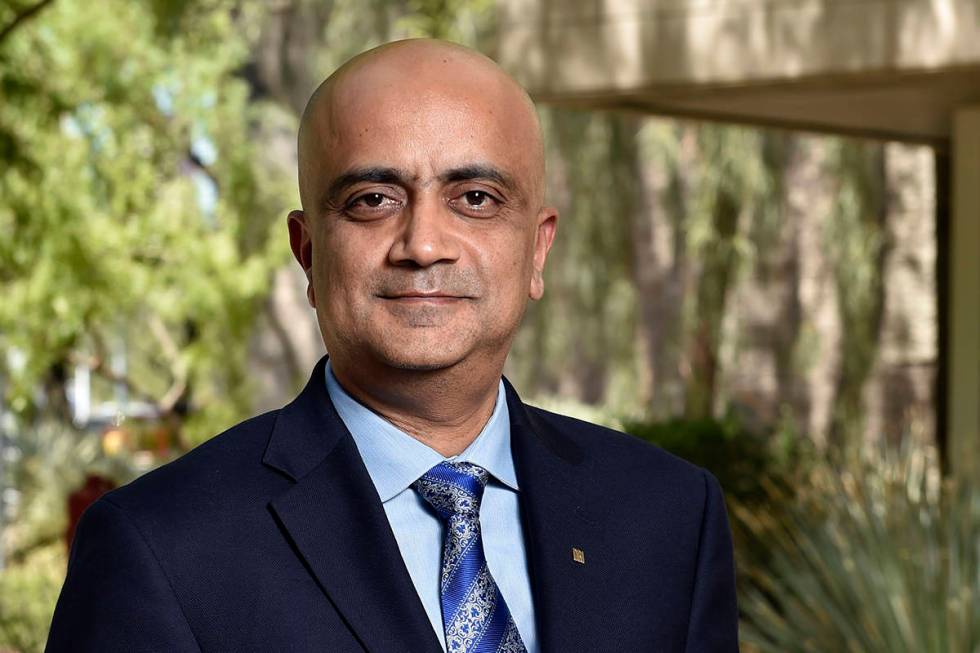Desert Research Institute gets permanent president amid COVID-19

After filling the role on an interim basis for a year, Desert Research Institute President Kumud Acharya is stepping into the position permanently amid challenges during the COVID-19 pandemic.
In September, the Nevada System of Higher Education’s Board of Regents approved a four-year contract with Acharya, which runs through Sept. 11, 2024. He’s receiving a $320,000 annual base salary.
DRI — established in 1959 — has campuses in Las Vegas and Reno and employs about 400 people. Its faculty members aren’t tenured and their salaries are generated through external funding such as contracts and grants.
Acharya said in a Tuesday interview with the Review-Journal that the first immediate challenge at DRI is “how we get through this pandemic without much damage to the institute” while receiving less state funding.
He said the institute gets only about 15 percent of its budget from the state, though, noting the school is affected less than other NSHE schools.
The state’s higher education system faces a total of $137.8 million in state budget cuts spurred by the coronavirus pandemic. In August, NSHE’s Board of Regents approved a one-time distribution of an estimated $79.4 million to colleges and universities by accessing unrealized gains in operating pool reserves. It was one of a number of steps the board has taken to help mitigate the impact of budget cuts on schools.
At DRI, Acharya said he’s always worried big outside grants may get canceled or postponed because of the pandemic. “So far, though, I think our grants have been intact.”
About 90 percent of faculty are working from home because of the pandemic, Acharya said. And child care is a challenge for some DRI researchers, he said, noting the institute wants to figure out how to help and give them a support system.
As for coronavirus-related research, through the Healthy Nevada Project — a population health study created several years ago by Renown Institute for Health Innovation in collaboration with DRI — scientists used an online survey tool to gather information from participants about their COVID-19 experiences, such as recent travel and whether they are experiencing virus symptoms.
Looking to the future as DRI’s president, Acharya said he wants to ensure cutting-edge research in order to sustain and compete in a competitive funding environment, noting most of the institute’s funding is through federal contracts. “We always have to be in the front end of the research (and) technology. It can be daunting and taxing to our people sometimes.”
It’s also a challenge to help faculty stay motivated, Acharya said, noting faculty retention is a long-term problem.
About the president
NSHE has been busy this year with hiring new top officials. NSHE Chancellor Melody Rose started in September, and UNLV President Keith Whitfield started in late August.
The University of Nevada, Reno’s new president — former Gov. Brian Sandoval — begins the job Oct. 5. And two virtual forums are slated for Thursday to provide an update on the search process for hiring a new Nevada State College president.
Acharya has a doctoral degree in biology and environmental sciences, master’s degree in environmental engineering and bachelor’s degree in civil engineering. He came to DRI in 2006 as an assistant research professor and has filled several roles.
He’s an ecological engineer “whose pioneering work in Nevada helped local and state water managers address aquatic invasive species threatening both Lake Mead and Lake Tahoe,” according to a September news release from NSHE.
Since he has been living in the community and working at DRI for about 15 years, Acharya said he feels he has a “pretty good understanding” of Nevada’s higher education system and the research institute.
Having someone with that background gives the school a leg up, he said, as well as having the trust of faculty and staff.
DRI is a bit different compared with other NSHE schools “because we just do research,” Acharya said, noting the institute is conducting about $40 million in research this year through external contracts.
“The research we do is great,” he said, and focuses on topics such as water resources and air quality.
Acharya said that when he asks people he meets if they have heard of DRI, many say “yes” but have no idea what the school does. He said he would like people to know DRI as being part of NSHE and for doing “premier, robust research” that affects lives.
Contact Julie Wootton-Greener at jgreener@reviewjournal.com or 702-387-2921. Follow @julieswootton on Twitter.